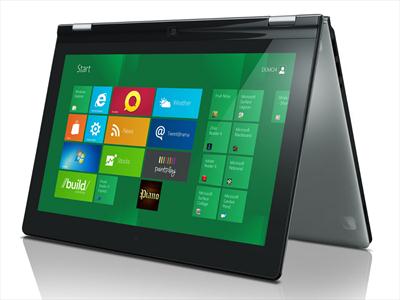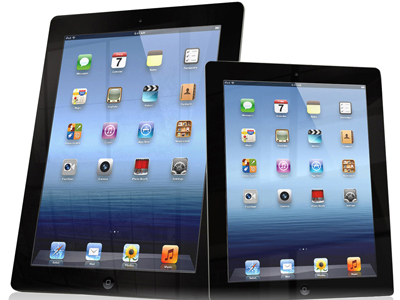Ultra Thin Notebooks Climbing While Desktop Sales Decline; Tablets Slowing
Recent numbers produced by Gartner reveal that while the overall number of devices sold in 2014 will be greater than what was seen in 2013, the projected number of traditional desktops and notebooks is continuing to drop, with 296.1 million units sold in 2013, 276.2 million units expected to be sold in 2014, and 261.6 million units in 2015.
The standard thin and light “ultrabook” sector will see a huge increase, with 21.5 million sold in 2013, 32.2 million projected to sell in 2014, and 55 million in 2015. Hybrid and clamshell “ultramobile” form factors are slowly catching on as well, with 3 million sold in 2013, 5.3 million expected in 2014 and 7.6 million projected for 2015.
Tablet sales, however, which have been skyrocketing, are no longer as prolific. “As with any devices, adoption goes through phases from the early to the late adopter,” the press release stated. “Tablets are currently moving onto the latter part of that curve in mature markets. Gartner estimates that sales of tablets will see a relative slowdown in 2014 to reach 256 million units, an increase of 23.9 percent from 2013.”
“Lower demand from users for tablets with smaller screens, some in favor of larger screens, in mature markets, and the shift towards phablets in South-East Asia are slowing global tablet penetration,” the press release added.
Just recently Apple revealed in its third quarter results (PDF) that its iPad tablet sales were down year-on-year for the second quarter in a row. 13.28 million units were sold during the quarter whereas 14.62 million units were sold in Q3 2013, which is down 9 percent.
Samsung in its second quarter results also noted a drop in tablet sales (PDF). “Shipments down due to weak overall demand, including declined demand for replacements,” Samsung reported. The company expects the demand to increase in the next quarter thanks to the season, new models and price competition, which is expected to “intensify.”
Numbers provided by Gartner show that Android has taken the lead in the operating system market, with 899 million units sold in 2013, 1.1 billion expected in 2014 and 1.3 billion in 2015. Following Android is Windows, iOS/Mac OS and a number of other platforms dumped into one single group. Apple’s iOS is expected to get a big boost once the iPhone 6 with its larger screen hit the market.
Get Tom's Hardware's best news and in-depth reviews, straight to your inbox.
According to a chart provided by Gartner in its release, Microsoft saw 326 million Windows device shipments in 2013, and is expected to see 333.4 million in 2014 and 373.6 million in 2015. Shipments include PCs, "ultramobiles" (including tablets), and mobile phones.

Kevin Parrish has over a decade of experience as a writer, editor, and product tester. His work focused on computer hardware, networking equipment, smartphones, tablets, gaming consoles, and other internet-connected devices. His work has appeared in Tom's Hardware, Tom's Guide, Maximum PC, Digital Trends, Android Authority, How-To Geek, Lifewire, and others.
-
Gam3r01 This is a sensible trend.Reply
Someone who needs basic computing and accessibility can use a tablet or notebook to do so, so desktop sales go down, however if anything desktops themselves are increasing in number.
Its becoming more and more common to build your own desktop, which I doubt is considered a "sale" -
CRITICALThinker I would like to point out the Incorrect spelling of million in the second to last sentence.Reply -
thechief73 I really don't know how this Gartner place stays in business. Every report I have ever read of theirs is either way out in left field or blatantly obvious. This is an obvious one. No kidding ultra small tablets are not selling people have their cell phones, and no kidding desktops are not selling because only power users need them and if they have any brains they will build their own workstation. So...... everything is converging in the middle where you have portability and also the power you need for average users. Who would have thought...Reply -
ozicom They are only make us thinking as they want. I mean sellers as they. I love my desktop pc and i love to change it as i want. So i don't think i'll love a laptop like my desktop :)Reply -
photonboy Portable laptops (or tablets) that easily double as your desktop, especially with a good Docking Station are a great idea.Reply
People got Tablets but then realized they still wanted keyboards. Hence the tablets that added keyboards (uh, isn't that a laptop?). I guess if the keyboard is removable it's technically a tablet + keyboard..
Anyway, for non-gamers we finally have really light laptop/tablets with Windows 8.1 (desktop/Metro as desired) that can be both portable AND serve your desktop. -
army_ant7 Reply13.28 million units were sold during the quarter whereas 14.62 million units were sold in Q3 2013, which is down 19 percent.
"19 percent"?! That seems huge. Something didn't seem right though.
I calculated the values and I only saw a drop of 9.166%! The "1" in "19" may be a typo but in my opinion it is one of the most misleading examples of errors. This should really not be allowed. :-(
Calculation: difference of old value and new value / old value; (14.62 - 13.28) / 14.62 = 0.09166 -
somebodyspecial I don't believe the ultrabook comment. I'll believe that when I see it, as they are just far too overpriced compared to what you get in a loaded regular laptop. There are not that many pure road warriors out there that require this type of overpriced LIGHT laptop. Most of us are bang for buck and an extra pound or two means nothing. The price of awesome laptop perf can be had far below the ultrabook neighborhood. Intel's sales have sucked for a reason. PRICE/Value.Reply
Tablets have slowed because we're waiting for 20nm that is right around the block. This close to something that important will put a lot of people off for purchases. I mean if you like K1's perf, at 20nm EVERY low-end chip will have that (of course the top will be M1 or whatever maxwell 20nm is named). Today low-end stuff can't play games at the ridiculous resolutions of most tablets (or even 1080p), but 20nm will allow pretty good gaming tablets from a lot of socs. A $200 unit will run like NV's shield today which is clearly a leader now. So why buy unless you absolutely have to for some reason? Wait 4-6 months and you'd likely double your gpu or more (bringing low-end to K1). On the cpu side they are all pretty close, but the gpu has huge differences from top to bottom. Now that users are keying more on gaming, they are aware the low stuff doesn't cut it. Since tablets are usually subsidized (unlike phones on contract) you spend a little time making sure you're buying a BETTER model. On contract people still seem to think that phone is free so not as picky, though it's stupid as that 2yrs apple contract costs you $1800-2400 ($75-100 month usually).
RE: lower pc sales, you have to realize they were selling 380mil worldwide, so a drop to 260 is a large haircut (mainly due to arm, 21% of notebooks when to chromebooks). Arm will steal more as 20nm, 64bit+androidL makes it into desktops (low stuff first) and more capable notebooks. I really don't understand Intel's stock price rise knowing this and the damage already done to notebooks and their profits (~13B 2011, ~11B 2012, $9.5B TTM, dropping yearly now). How do they think ultrabooks will increase massively when the world has proven they'll take good enough chromebooks instead and they haven't even made it into a 500w PC like box desktop yet. When ultrabooks don't also come with an ULTRA price, maybe they'll increase massively.
I wouldn't be surprised by 20% desktops being arm by next xmas (2015 xmas, not this year) as 20nm is all over IF someone puts them in two boxes. One with soc only and another with an NV discrete gpu for really good gaming. So I'm saying competition for the $300 dell/hp box on low-end and good competition for a $500-1000 PC (with your choice of Nv gpus in the whole range). What you save in the box comes at the expense of windows apps, which for many won't matter one bit as chromebooks show. They want to merely browse, email, consume vids/music and game. You don't need windows for any of these 5 things. NV will surely put out both with Denver and beyond, with NVlink replacing buses from Intel/AMD and PCIE (hypertransport & infiniband can be replaced with NVlink along with PCIE as NV has already noted with pascal talks). The whole point of unified memory is to share it with their own cpu and gpu. So your cpu/gpu will talk over NVlink with 3d stacked memory. That's going to be a competitive PC for the 4 tasks mentioned and can come with a tri-boot of 3 OS's that are free. Linux, SteamOS and AndroidL giving the user a TON of software already out there and more coming every day. SteamOS will be ported to ARM shortly either by NV or Valve or both working together. Nvidia's goal is to steal Intel cpus sales and keep selling you gpus on either side. You grow your revenue by putting YOUR cpus in boxes to replace Intel/AMD completely and do it with FREE operating systems. At the same time you kill DX/Wintel more and push OpenGL which devs will love due to portability speed. Intel has 20x the income of NV. They want some of it and will get it via a WINTEL-LESS pc. ;)
Also that cpu/nvlink/stacked memory combo will replace AMD/Intel in their top500/green500 supercomputers. NV will feed their gpus with their own cpus. Owning NV stock is a no-brainer, and I'm not even talking cars etc. They'll either explode on their own or be a takeover target by google/ms/Intel who could all afford the ~$23-25B tag (more? Market cap ~9.5B with all the patents maybe far more). MS makes that almost a year. Google 1/2 of it, so only 2yrs income to own great stuff for them (socs for all their devices to expand their power in cheap devices for longer, vertical integration just like apple/samsung/qcom, the more you can integrate on your own the better). MS can do the same now that they own Nokia it would be wise to buy NV. Not sure if Intel can get it done without making Jen Hsun CEO as he has stated he'd want. Too much hate for that between them and their engineers on both sides probably but definitely Intel's best move to stop losing $4B a year on mobile. Put out a 14nm K1 next year and you'll do some damage to Qcom's train from then on, alone keep losing 4B+ which at some point will piss off shareholders. -
ceh4702 I think a lot of people are just using their cell phone or tablet as a computer instead of using a computer. So including smartphones should be part of the survey. Some people also use their tablets as phones using Skype also. This can blur the lines of what is a computer and what is a cell phone.Reply

